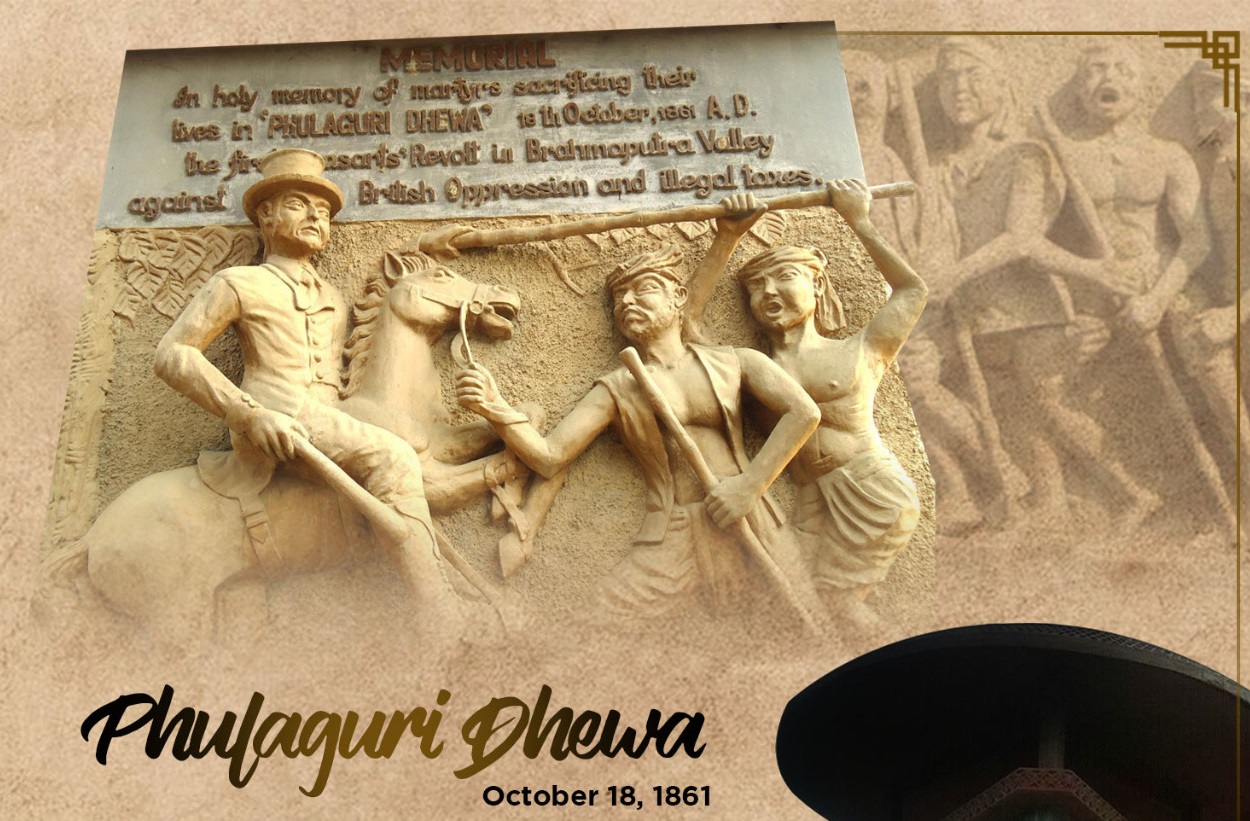NE UpdatesHappeningsBreaking News
Phulaguri Dhewa: 160th anniversary of 1st peasant uprising in Assam against British Raj

Oct. 18: Monday marked the 160th anniversary of “Phulaguri Dhewa” the first peasant uprising in Assam against the British Raj. Taking to his twitter handle, Assam chief minister Dr Himanta Biswa Sarma wrote, “I offer my humble tributes to the martyrs of Phulaguri Dhewa who had sacrificed their lives for the motherland.”
The peasant uprising in the Phulaguri area of middle Assam in October 1861 AD was the first ever peasant movement in the context of Indian freedom movement, which took place much before the Champaran movement took place under the leadership of Mahatma Gandhi. It was also the first instance of non-cooperation because the farmers of Phulaguri region had stopped payment of taxes to the British administration and thus openly defied the rulers.
Today marks the 160th anniversary of the first peasant uprising in Assam against the British Raj.
I offer my humble tributes to the martyrs of Phulaguri Dhewa who had sacrificed their lives for the motherland. pic.twitter.com/CMkryio4Ht
— Himanta Biswa Sarma (@himantabiswa) October 18, 2021
The tribes in Assam were generally freedom-loving people. Their only occupation was agriculture. They were,
therefore, dependent on land. So, whenever, the British imposed taxes on land and hampered their traditional
beliefs they took it as a challenge to their rights and revolted against the local British officer. The Phulaguri uprising was a movement by and large of tribesmen, Lalung and Kachari; but it was blessed if not actively co-operated by the well-to-do middle-class peasant proprietors, mouzumdars and the government servants who were no less affected by recent taxes on income, trade and profession.
 The phulaguri uprising of 1861 was the first instance of determined resistance by the riots of Assam through the institution of Raijmel. In 1860, the British government banned the cultivation of poppy, thereby making the people totally dependent on Government opium and this prohibition order shattered the domestic economy of the tribal areas where consumption of opium was estimated highest in the province. Moreover, it had also effects on the social custom and habit of the tribal people around the same time, the government was finalising the scheme for the introduction of the licence tax and although this tax was not originally proposed to be extended to Assam, the tribal people were alarmed at the prospect of another impending tariff. Meanwhile, a rumour spread that a new tax was to be levied upon their houses, baries and pan (betel leaf) cultivation.
The phulaguri uprising of 1861 was the first instance of determined resistance by the riots of Assam through the institution of Raijmel. In 1860, the British government banned the cultivation of poppy, thereby making the people totally dependent on Government opium and this prohibition order shattered the domestic economy of the tribal areas where consumption of opium was estimated highest in the province. Moreover, it had also effects on the social custom and habit of the tribal people around the same time, the government was finalising the scheme for the introduction of the licence tax and although this tax was not originally proposed to be extended to Assam, the tribal people were alarmed at the prospect of another impending tariff. Meanwhile, a rumour spread that a new tax was to be levied upon their houses, baries and pan (betel leaf) cultivation.
 Around 1000 peasants gathered at the Sadar court at Nowgong on 17th September, 1861 to register their protest. Deputy Commissioner Sconce, failed to address the gathering, some riots forced their way into his office.
Around 1000 peasants gathered at the Sadar court at Nowgong on 17th September, 1861 to register their protest. Deputy Commissioner Sconce, failed to address the gathering, some riots forced their way into his office.
Sconce had the trespassers arrested for their „riotous and disorderly conduct‟ and imposed a fine on them.
About four weeks later, the peasants made another representation against the prohibition of opium cultivation and the proposed new taxes. But they failed to receive a satisfactory reply. Therefore, they decided not to pay taxes when they were levied.
 When the peasants defied the orders, the Deputy Commissioner appointed Lieutenant Singer, the assistant commissioner to deal sternly with the situation. The crowd had increased to over 3000 and they were armed with clubs and sticks. They denied following the orders of Singer. The riots became so aggressive that they beat him to death and threw his dead body to the Kalang River. A number of peasants were subsequently arrested and tortured for the act.
When the peasants defied the orders, the Deputy Commissioner appointed Lieutenant Singer, the assistant commissioner to deal sternly with the situation. The crowd had increased to over 3000 and they were armed with clubs and sticks. They denied following the orders of Singer. The riots became so aggressive that they beat him to death and threw his dead body to the Kalang River. A number of peasants were subsequently arrested and tortured for the act.
After that, the peasants proceeded in the direction of the government treasury with an intention to plunder it, but they were obstructed by some sepoys on the way. Captain Campbell was in the command of this re-inforcement. He came to Phulaguri with his command. The agitationists also gathered again in order to review the situation. Campbell surrounded those unarmed people and started firing upon them, leading to the instant death of 39 persons and serious injury to hundreds. Only 66 persons remained capable of standing. All of them were taken on feet to Nagaon and put in a temporary jail.





